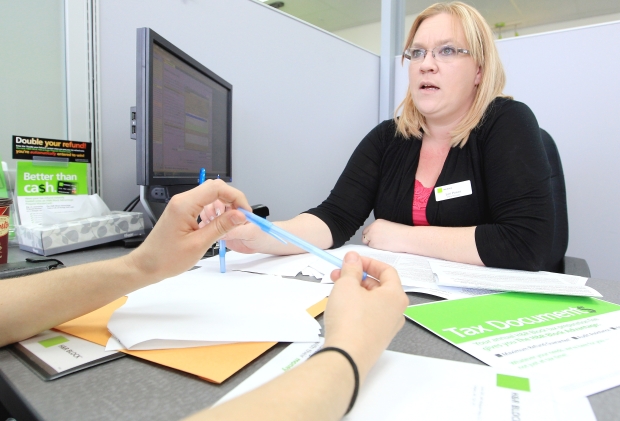As Albertans struggle to file their income tax returns by the April 30 deadline, they may console themselves with the belief that at least they’re paying less than residents living elsewhere in the country.

The provincial government brags about the “Alberta tax advantage” created in part by the province’s flat rate on income, but the fact is middle and low-income earners could save on that levy by moving to Vancouver or Toronto.
For example, an Albertan with a taxable income of $70,000 pays $1,434 more than a B.C. resident and $919 more than someone living in Ontario.
Despite the province’s higher personal exemptions, individual Albertans making as little as $30,000 still pay hundreds of dollars more than they would in the other two provinces.
Tax preparation specialists at H and R Block in Calgary find that the dozens of clients who flood their offices this time of year seeking help with their returns just assume income taxes are lower in Alberta.
“We’re aware they’re not because that’s our job,” said district manager Dolores Osvald-Penl, “but they have no idea.”
The advantage from the province’s proportional tax of 10 per cent kicks in at higher income levels where other jurisdictions have more progressive rates.
An Albertan who makes $1 million pays $41,095 less than a B.C. resident and $75,157 less than someone living in Ontario.
“We may be the Cayman Islands of Canada for the rich,” says Bill Moore-Kilgannon, executive director of Public Interest Alberta, “but for the middle class, there is no income tax advantage to living in this province.”
Provincial officials still calculate that Albertans at just about any income level have a lower overall tax load after adjusting for the absence of a sales tax, no health care premiums and lower levies on gasoline.
The proportional income tax, introduced by the Klein government in 2001 with the promise it would mean all Albertans would pay less, has cost the provincial government billions in foregone revenue over the years.
The province’s own numbers show it could collect an extra $200 million this year if it adopted the regime in place in B.C. prior to that government’s recently-announced hike on top earners.
It would have an additional $1.6 billion if it used Ontario’s levies.
UBC economist Kevin Milligan said the Alberta government may want to revisit the flat tax as it searches for additional revenue to shore up its finances and eliminate the deficit.
“People always talk about a sales tax as the solution to Alberta’s financial woes, but it’s hard not to see that as an additional burden on the middle class who are already carrying the bulk of the income tax load,” he said.
“Raising the income tax on the rich is really about digging where the gold is.”



Comments